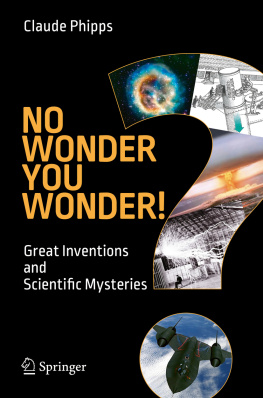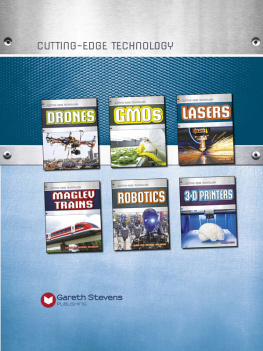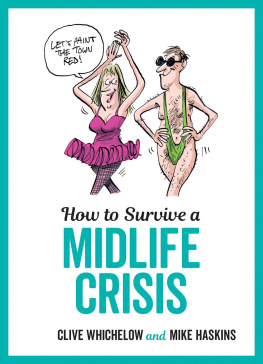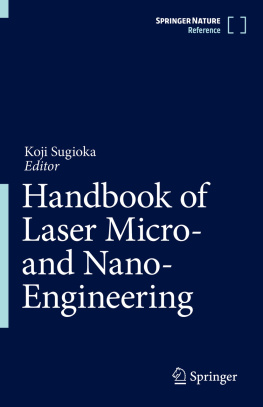Preface
Lots of scientists can write equations. I can, too! But, as a way of communicating, they are off-putting to anyone who didnt go flying through Algebra II and Calculus, let alone Differential Equations. My goal here is to make the complex simple, instead of the other way round. There is nothing you have to read first in this book. You may want to glance at the Numbers and Metric System chapters first, if youre not comfortable with those things. But you can start anywhere that interests you and read backwards and forwards. Thats my kind of book!
Who Am I?
Im a retired scientist in Santa Fe, New Mexico. My expertise is in the physics of pulsed lasers interacting with materials. I have a Ph.D. in plasmas from Stanford, and a Masters from MIT. I worked at the Livermore and Los Alamos labs for many years. So far as I know, I never worked on anything that would hurt someone. I have run a conference called High Power Laser Ablation in Santa Fe every two years since 1998. I still work 50 h a week. Even in science, my intention has always been to make the complex simple. Im also a poet and writer, and history is one of my favorite things.
When I look out my window at the world, I see an infinitely complex place full of interrelated things. Poke it anywhere, ask a question like why is the sky blue?, and that question will bore down and branch out into a thousand more questions which are all part of physics. Thats why its such a great field. I dont want to be a narrow expert in anything, but rather knowledgeable about it all. It is still possible ! Thats one reason I wrote this book. I know there are a lot of you out there, who are curious but are not encouraged by the way science is usually taught. You will notice its written here in a personal, narrative way, and that the same topic shows up in various ways in several chapters, rather than being organized in some hierarchy. For that reason, Ive put in links connecting discussions of the same thing. You can understand it without getting a degree in it.
The second reason for the book will become more clear in the very first chapter, where I insist that youre not entitled to your own facts. The Internet is a tremendous resource, but it has no filtering mechanism and its easy for one persons particular opinion to become what Einstein said.
What is Science and What is Not?
Heres a bit of philosophy: What is science anyway? Is it Francis Bacons scientific method, which you may have learned in school: First, form a hypothesis? Of course not! Those ideas were written by Lit and History Majors! Few scientists do science that way. Scientists are human. Science starts in the belly with a hunch, a wish to leave a mark on the world, a sudden crazy thought in a conference, a vision of the benzene molecule in a dream. After I make my theory and think Ive proved it, does a contrary result cause me to abandon it? Of course not! All this work was worthwhile after all! If others try to prove me wrong, Ill fight like hell until I have to admit theyre right!
But, the results of science are not just belief or faith. Theyre not arbitrary. Science is a reality-based community. Do you follow me? Any good scientific result must tie into reality.
By reality, I mean this: if there is an agent here that I can identify and measure , and it acts in the same measurable way everywhere for everyone , then its a scientific fact, part of reality. Whether I as a scientist understand it, or not, doesnt matter. It's a gift if I don't: a new relationship to figure out and then tie into the rest of them.
The squishy things happen when I try to explain a scientific fact with a theory about why it happened, because that depends on my imagination and training, and on the state of science in my time. But the foundation of facts is not so squishy. A good scientist is ready to admit that a new and better explanation of things than she learned is possible. After a thousand years of pretty good science, we start from an agreed set of basic ideas (force is mass times acceleration) that have been proven so often we dont give them a second thought. Why is that? Because experimental scientists have proved these basic theories so many times, in so many different ways, in the lab, some of them out to dozens of decimal places. My theory is no longer squishy when its proven.
I dont have a right to make up my own facts. Others have to agree.
Science is a continuing process of finding where basic ideas break down and discovering new and better ideas to explain what you can see. For example: you can weigh something and find its mass, and the tick of a clock is the tick of a clock. Yet, as Einstein realized just a century ago, while we can all agree on what we mean by mass, speed, lifetime, and length in our own backyards, we will not agree even approximately when Im going at 90 % of the speed of light away from you! This does not mean, as you may have heard, that Einstein said everything is relative. He didnt. His theories of relativity have been proven to microseconds for clocks on satellites circling the Earth, and for multiply extended lifetimes of fast atomic particles that ought not to live as long as they do.
The thrilling part of science is discovering brand new things, like the Higgs boson, which Peter Higgs actually lived to see, or in doing brand new things like landing on the Moon.
Its been a pretty rapid change. Three hundred years ago, you couldnt have bought a battery (although those clever Arabs may have made a few for electroplating 2000 years ago!), and electric lights of any sort were not known until about 1800. Two centuries ago, people were just finding out about electric currents and magnetic and electric fields and how they can produce each other. Electric street and house lights required generators, and these were not perfected until the time of Lincoln. Nobody knew how far away the stars really were until a hundred years ago. Now, the set of scientific facts you will learn in school changes dramatically in one human lifetime. And that is why school takes a long time.
Science is a strong belief system for me. My belief is that science is the best way to approach reality.
Belief is a funny word. It all comes down to what I think is true. Miracles and magical outcomes are strong belief systems for many, many people. Garcia Marquez got a Nobel prize for stories about that kind of reality and I find his stories beautiful, but that world is a different one from the scientific one.
My observation is that 3050 % of people believe things that have no scientific basis, and call it science. If it works for them it would be cruel as well as hopeless to try to disprove their beliefs. Lord knows, at least that fraction of the U.S. population believes the world was made 6000 years ago. Nikita Khrushchev once said, If the people believe theres a river over there, dont tell them theres no river. Make an imaginary bridge over the imaginary river! And that is good advice for all of us.
I cannot measure energy, as that word is used colloquially. People see and feel auras or they dont, and thats anecdotal, not reproducible. Energy, in my field, is measured in joules. The energy of a blue photon is always the same. When those guys at CERN fired two proton beams at each other and found the Higgs boson resonance at 125 billion volts of energy, after millions and millions of shots, to me, it was justified and even a holy event to play the Ode to Joy from Beethovens ninth in the movie Particle Fever. If you havent seen that movie, go do it!
Theres a deeper fear for me, and thats what this preface is about: when it appears the majority of people in general (not you, dear reader!) are starting to doubt that there is a factual reality and prefer the reality on their favorite blog or hearsay from a friendof course, we know that, Einstein said that (poor Einstein, he said so many things)the entire Enlightenment Experiment, the basis of Modern Civilization is doomed. Yes, I know I already ranted about that in Chap. !









